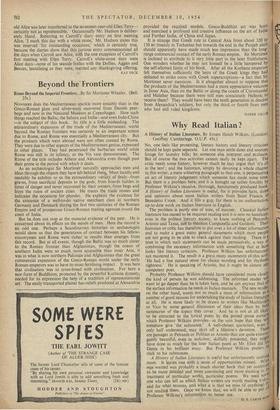Why Read Italian?
A History of Italian Literature. By Ernest Hatch Wilkins. (London: Geoffrey Cumberlege. O.U.P. 45s.)
No, one feels like protesting, literary history and literary criticism should be kept quite separate. Let one man settle dates and sources, forage for laundry bills; let, someone else interpret and evaluate. But of Course the two activities cannot really be kept apart. The critic needs some history, however much he may argue that 'it's all in the text'; and the historian, simply by devoting a whole chapter t(z this writer, a mere withering paragraph to that one, is perpetuating an act of literary judgement which someone has made some time. But there is a problem here, and it is brought up rather forcibly by, Professor Wilkins's massive, thorough, handsomely produced book, A History of Italian Literature is useful, for it provides facts, dates and opinions about most Italian writers from Saint Francis 10 Benedetto Croce. And it fills a gap, for there is no authoritatke, up-to-date work on Italian literature in English.
The problem is partly one of tone, of manner. Classical Italian literature has ceased to be required reading and it is now no handicaP) even in the politest literary society, to know nothing of Petrarcl), Ariosto and Tasso, ndt to mention Campanella and Goldoni. Their historian or critic has therefore to put over a lot of sheer information and to make a great many general statements which most peoPlc are not going to be able to check against their reading. There is 3‘. tone in which such statements can be made persuasively, a way 01 combining the necessary information with something that at least looks like literary criticism. Professor Wilkins has unfortunatclY not mastered it. The result is a great many statements of this sort: 'He had a fine natural sense for choice wording and for rhythmic rightness.' He is speaking of Ariosto, but it might be almost anY competent poet. Probably Professor Wilkins should have considered more close& the kind of person he was addressing. The informed reader ■N'tl! want td go deeper than he is taken here, and he can anyway find the surface information he needs in Italian manuals. The new reader, on the other hand, wants not so much a mass of information as 3 number of good reasons for undertaking the study of Italian literatur,e, at all. He is more likely to be drawn to writers like MachiaNeh; or Vico by some general discussion of their ideas than by Nil' summaries of the topics they cover. And he is not at all Ilk& to be attracted to the lyrical poets by the potted prose extract! which Professor Wilkins provides—in the vain hope that they somehow give 'the substance.' A well-chosen quotation, even 0 only half understood, may start off a lifetime's devotion. There are passages in Petrarch or Politian or Ariosto that are quite extra"3; gantly beautiful, even in isolation; skilfully presented, they mI have done as much for the later Italian poets as Mr. Eliot did for Dante in his brilliant essay: But Professor Wilkins prefers I° stick to his substances. A History of Italian Literature is useful but unfortunately nothing, more. It leaves one with a sense of opportunities missed. NV line' was wanted was probably a much shorter book that yet collo iN:! to be more detailed and more convincing and more exciting in treatment of particular works, particular poems. We need son', one who can tell us which Italian writers are worth reading and for what reasons, and what it is that we miss (if anything) t not reading them. Once we know that, we will be able to put Professor Wilkins's information to better use. 1S5








































 Previous page
Previous page